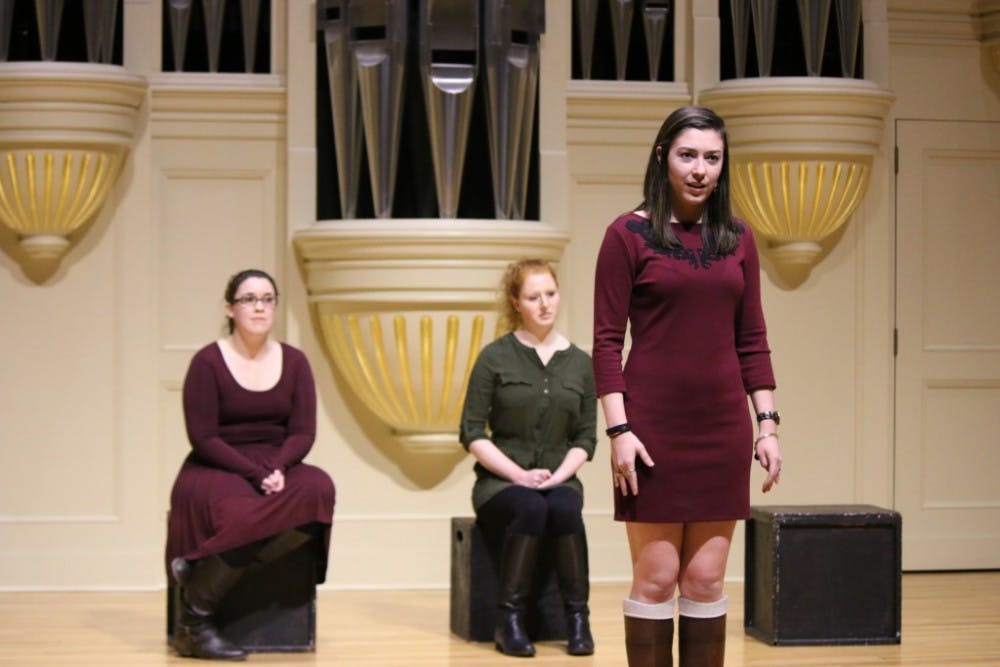Valentine’s Day this year brought a variety of celebrations to Elon University —one of them being a performance of “The Vagina Monologues.” Written by playwright Eve Ensler and first performed in 1996, the play was created through Ensler’s interviews episodic play with more than 200 different women.
The women ranged from 6 to 72 and were interviewed about their views on relationships, sex and violence against women. Raising awareness for violence against women was one of the main focuses of the play for Ensler.
The play has carried that focus into 2015. The proceeds of Elon’s performance went to Crossroads Sexual Assault Response and Resource Center. According to its website, Crossroads serves “child and adult victims of sexual abuse through confidential counseling, advocacy, child medical treatment, education, and community awareness.”
While the play features some serious monologues highlighting sexual violence — including those about rape and child molestation —the humorous bits stole the show, especially the performance titled “The Angry Vagina.”
The monologue, highlighting the many ways people find to change and “torture” women’s vaginas, inspired shouts and applause from the audience in agreement.
“When something is hidden, it goes along with being guilty,” said Sharon Eisner, professor of gender studies and communications. “When something is spoken of, we’re able to take a sense of empowerment, and women should not feel that they have to hide who they are, a very basic part of who they are. We shouldn’t feel like [a vagina] can’t be spoken of, like it’s a dirty word.”
Acknowledgement is a huge part of “The Vagina Monologues.” While introducing the monologues, the narrators, senior Brianna Duff, freshman Zaria Zinn and sophomore Sarah Wright, explained that when the original interviews were conducted, women were reluctant at first to discuss the questions. But as the interview proceeded, they found it hard to stop talking.
The interviewees were reluctant because they had never been asked about it before. As Eisner said, “The Vagina Monologues” hopes to increase the conversation and acceptance of discussion about vaginas and women themselves.
“We need to acknowledge our bodies,” said the narrators at the end of the play. “Our vaginas.”
The monologues included quite a few perspectives, including a 6-year-old, a Bosnian rape survivor, a vagina workshop participant, a 72-year-old who had never seen her own vagina and a woman who was just happy to have found a guy who “liked to look at it.”
Male involvement in “The Vagina Monologues” is important. The first monologue in the show, titled “Hair,” is about how women feel the need to change their own bodies to fit the expectations of men.
“We live in a culture where women routinely perform surgery to be more attractive,” Eisner said. “Many people prioritize the experience of being looked at over experience in their own bodies. It’s hard for men to get these issues unless they hear true stories. One or two will really make a difference in their world view.”
“The Vagina Monologues” strives to push these issues to the front of people’s minds. Audience members walk away with a different view of the female body — a view that emphasizes loving your body for what it is.
“I think it’s a great way to spend your Valentine’s Day,” said sophomore acting major Emily Collins, who performed in the play last year. “The show contains material that is funny, sentimental and powerful.”
Collins also believes that “The Vagina Monologues” addresses issues that are especially prevalent on college campuses.
“The pressures and issues of assigned gender roles and insecurities about physical appearance are present at most, if not all, college campuses,” she said. “So, on the day to celebrate love, [“The Vagina Monologues”] reminds us to love each other for who we are. The show encourages women to embrace all that makes them unique and beautiful.”
Eisner also believes it is important for men to see women and vaginas in a different way than they see them in pornography.
“I really, really feel strongly that a lot of our culture experiences vagina as a part of porn rather than as a life experience,” she said. “I am of the opinion that it would be good if men would watch [the show].”
In a society where porn is readily available at all times on the internet, the need for plays like “The Vagina Monologues” has become more significant. Gender professionals think both men and women need to have a more respectful and realistic view of the female body.
When the play was first performed almost two decades ago, people were skeptical because of the discussion of controversial subjects. As society rapidly continues to change, some critics accuse “The Vagina Monologues” of not being inclusive enough.
Though the play seeks to achieve such basic goals, it has received acclaimation for its exclusivity and honest approach to such harsh topics.
The play was canceled this year at Mount Holyoke College in Massachusetts for excluding the experiences of transgender women who don’t actually have vaginas.
Elsewhere, it was well received at Elon. Audience members laughed throughout the performance at appropriate moments and fell silent at moments when tough issues were addressed.
Senior and narrator Brianna Duff attributes her decision to the uniqueness of the opportunity and how it addressed issues that affect her personally.
“I wanted to challenge myself to be a part of something that pushed me outside my comfort zone and in how I spoke about women’s issues,” Duff said.
The acknowledgement of these issues is something Duff thinks “The Vagina Monologues” approaches in a unique way.
“‘The Vagina Monologues’ is an unapologetic examination of a number of things burdening women all over the world,” she said. “I think ‘The Vagina Monologues’ is an amazing way to bring awareness to these issues without feeling too technical or too removed from those who are affected.”


